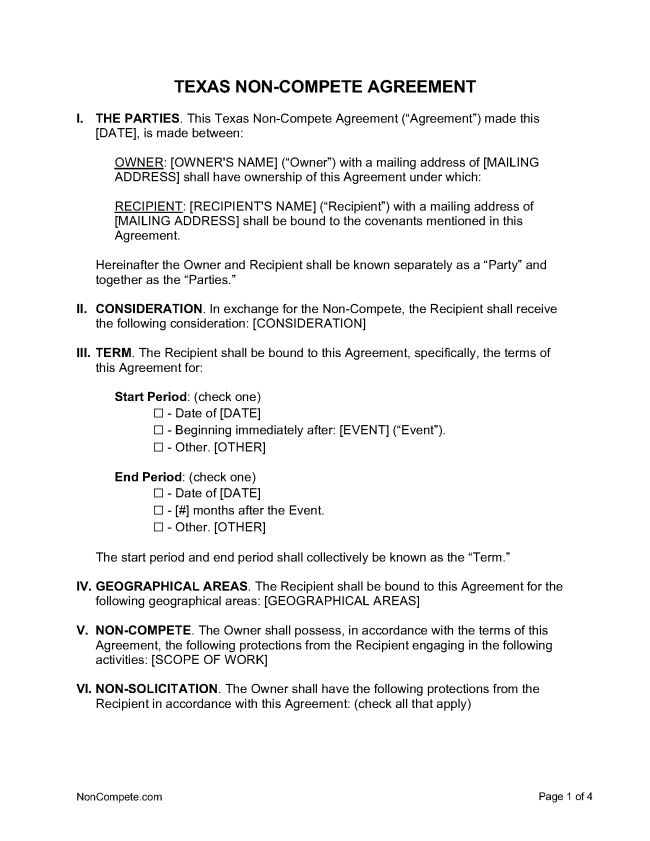A Texas non-compete agreement is a restraint of trade that prevents a worker or business owner from operating in a particular field. Texas non-compete agreements are governed by a relatively brief statute, but the rules have prompted significant litigation, and have resulted in enforcement requirements that are very different from other states. Because of this, trying to use a non-compete agreement created for one state and adopting it to one for use in Texas is highly discouraged.
Table of Contents |
Are Non-Competes Enforceable in Texas?
Yes, non-competes are enforceable if they are part of an otherwise enforceable agreement, and meet the following conditions:
- The agreement is enforceable at the time it is made, meaning that it contains reasonable limitations on
- Time,
- Territory covered, and
- The activity prohibited; and
- The restraints of the agreement are no more significant than necessary to promote a legitimate business interest of the employer.
Tex. Bus. & Com. Code Ann. § 15.50.
Legitimate Business Interest
The meaning of legitimate business interest in Texas is quite complicated, and is intertwined with the issue of valid consideration. At its most basic level, the interest that the employer is seeking to protect with the non-compete agreement must be the same thing that the employee is offered as consideration. (Alex Sheshunoff Management Services, L.P. v. Johnson (2006).
For example, a trade secret meets this definition, because it is what the employer is trying to protect, and what the employee is being “given” by working for the employer.
For this reason, many interests recognized as legitimate protectable interests in other states are not valid in Texas. Interests that are protectable include:
- Business good will
- Confidential or proprietary information
- Knowledge of a customer base
- Knowledge of customer needs, such as equipment.
TransPerfect Translations, Inc. v. Leslie (2009).
Sale of Business vs. Employment Contract
Although the Texas statutes refer specifically to non-compete agreements arising from employment contracts, unlike other states, non-competes associated with the sale of a business are judged by roughly similar standards. They must be:
- Part of a valid contract protecting a legitimate business interest; and
- The extent of the restraint in the agreement must be no greater than necessary to protect the business interest;
- This means that the agreement must be limited in terms of duration, territory covered, and activity prohibited.
DeSantis v. Wackenhut Corp. (1990).
Remedies
Under Texas law, parties with a valid non-compete agreement may obtain a court order to prevent the employee from violating the agreement or recover damages from a violation that has already occurred. Tex. Bus. & Com. Code Ann. § 15.51(c).
Prohibited Professions
Attorneys cannot join non-compete agreements that restrict their right to practice in the future and are found in:
- Partnership agreements or employment contracts, except those concerning retirement benefits. Rule 5.06(a), Texas Rules of Professional Conduct.
- Case settlements, except for disciplinary agreements imposed by authorities. Rule 5.06(b), Texas Rules of Professional Conduct.
Non-compete agreements involving physicians are permitted if the agreement:
- Does not deny the physician the right to see any patient seen in the previous year;
- Allows the physician to continue to access patient’s medical records;
- Does not mandate that medical records be provided in a different format than the physician is accustomed to;
- Includes a buyout provision, in which the physician can ignore the agreement by paying a fixed fee; and
- Does not under any circumstance interrupt the physician from providing continuing treatment to any patient suffering an acute illness.
Tex. Bus. & Com. Code Ann. § 15.50(b)
Burden of Proof
If the primary purpose of the contract that the non-compete is associated with is for the employee to provide personal services, then the employer has the burden of proof. If the contract has a different primary purpose, then the party opposing enforcement has the burden of proof. Tex. Bus. & Com. Code Ann. § 15.51(b).
Continued Employment (consideration)
Continued employment is not adequate consideration to support a non-compete agreement. See the section on Legitimate Business Interest for what may constitute sufficient consideration. (Mann Frankfort Stein & Lipp Advisors, Inc. v. Fielding (2009)).
Maximum Term
There is no statutory maximum term, but cases note that agreements covering periods lasting between two and five years are often enforced. (Johnson Service Group, Inc. v. Olivia France (2011)).
Blue Penciling (allowed)
If a provision of a non-compete agreement regarding the duration, territory covered, or scope of prohibited activity is unreasonable, courts are obligated to modify the provisions, and enforce the agreement to the extent that it is reasonable. Tex. Bus. & Com. Code Ann. § 15.51(b).
